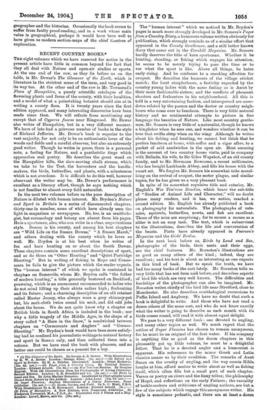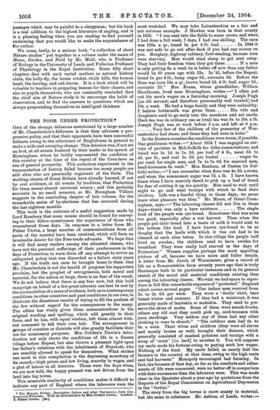THE eight volumes which we have reserved for notice in
the present article have little in common beyond the fact that they all deal with Nature and open-air studies or sports. At the one end of the row, as they lie before us on the table, is Mr. Dewar's The Glamour of the Earth, which is literature in the strictest sense of the term, and very good in its way too. At the other end of the row is Mr. Townsend's Flora of Hampshire, a purely scientific catalogue of the flowering plants and ferns of the county, with their localities, and a model of what a painstaking botanist should aim at in writing a county flora. It is twenty years since the first edition appeared, and many interesting discoveries have been made since then. We will refrain from mentioning any except that of Cyperus fuscus near Ringwood. Mr. Dewar also writes of Hampshire, but in a very different manner. We have of late had a grievous number of books in the style of Richard Jefferies. Mr. Dewar's book is superior to the vast majority, for not only is be an enthusiastic lover of the woods and fields and a careful observer, but also an extremely good writer. Though he writes in prose, there is a personal note, a feeling for Nature, and a pantheistic tinge which approaches real poetry. He describes the great wood on the Hampshire hills, the slow-moving chalk stream, which we take to be the Test, the harvesters and the hurdle- makers, the birds, butterflies, and plants, with a minuteness which is not overdone. It is difficult to do this well, however observant the writer may be. Mr. Dewar's performance is excellent as a literary effort, though he says nothing which is not familiar to almost every field naturalist.
In the next two volumes before us the pure description of Nature is diluted with human interest. Mr. Bryden's Nature and Sport in Britain is a series of disconnected chapters. thirty-one in number, some of which have already seen the light in magazines or newspapers. He, too, is an ornitholo- gist, but entomology and botany are absent from his pages. He is a sportsman, also, who can write in a clear, unpretentious style. Sussex is his county, and among his best chapters are " Wild Life on the Sussex Downs," " A Sussex Marsh," and others dealing with the county which he loves so well. Mr. Bryden is at his best when he writes of fox and hare hunting on or about the South Downs. These chapters contain some excellent descriptions of sport, and so do those on " Otter Hunting " and " Quiet Partridge Shooting." But in writing of fishing in Mayo and Conne- mara he fails to give the picture which the reader expects. The "human interest" of which we spoke is contained in chapters on Somervile, whom Mr. Bryden calls "the father of modern hunting," a title generally bestowed on Beckford ; prawning, which is an amusement recommended to ladies who do not mind lifting up their skirts rather high ; foxhunting and its future ; and a charming description of an old retainer called Master Jessey, who always wore a grey chimney-pot hat, his neck-cloth twice round his neck, and did odd jobs about the house. We do not quite know why a chapter on British birds in South Africa is included in the book ; nor why a little tragedy of the Middle Ages, in the shape of a story called "A Hare in the Snow," is sandwiched between chapters on " Cormorants and Anglers " and " Grouse- Shooting." Mr. Bryden's book would have been more satisfy- ing had he confined his journalistic writings to natural history and sport in Sussex only, and then collected them into a volume. But we have read the book with pleasure, and no better one could be chosen as a present for a boy.
• (1) The Glamour of the Earth. By George A.B. Dewar. With Illustrations by R. W. A. Rouse. London : George Allen. [6a. net.]—(2) Nature and Sport in Britain. By H. A. Bryden. Illustrated. London : Grunt Richards. [10s. 6d. net.]—(3) Pages from a Country Diary. By Percival Somers. London : Edward Arnold. [7s. 6d.] —(4) Wee 7tm'rous Beasties. By Douglas English. With 150 Illustrations from his Photographs of Living Creatures. Second Edition. London : S. H. Bousileld and Co. [5s. net.l —(5) Birds by Land and Sea. By John Maclair Boraston. Illustrated by Photographs taken Direct from Nature by the Author. London : John Lane. (10s. 6d. net.]— (6) Super Ftumina : Angling Observations of a Coarse Fisherman. Same publisher. [5s. net.]—(7) Douse, Garden, and Field. By L. C. Miall, F.H.B. With Illustrations by A. R. Hammond. London : Edward Arnold. [6s.]- (8) Flora of Hampshire. A New Edition, with Numerous Additions. By Frederick Townsend, M.A., F.L.S., &c. Illustrated with 2 Plates and a Map. London: Lovell, Reeve, and Co. [Els. net.] The " human interest" which we noticed in Mr. Dryden's pages is much more strongly developed in Mr. Somers's Pages from a Country Diary, a humorous volume written obviously for publication, which strongly reminds us of a similar effort that appeared in the County Gentleman, and a still better known diary that came out in the Cornhill Magazine. Mr. Somers hardly deserves the title of keen sportsman. Whether it be hunting, shooting, or fishing which engages his attention, he seems to be merely trying to pass the time or to see what the sport is like. Above all things, he hates early rising. And he confesses to a sneaking affection for croquet. He describes the humours of the village cricket match ; the hunt steeplechases, a festivity regarded by the country young ladies with the same feeling as is Ascot by their more fashionable sisters; and the conflicts of pheasant shooters and foxhunters in his neighbourhood. All this is told in a very entertaining fashion, and interspersed are anec- dotes related by the parson and the doctor or country neigh- bours who come over to luncheon. There is very little natural history and no sentimental attempts to picture in fine language the beauties of Nature. Like most country gentle- men, Mr. Somers is very little of a naturalist, though he knows a kingfisher when he sees one, and wonders whether it can be true that swifts sleep when on the wing.' Although he writes about his fishing and hunting, we cannot but think that he prefers luncheon at home, with coffee and a cigar after, to a packet of arid sandwiches in the open air. Most amusing is the account of two country house visits, paid in company with Belinda, his wife, to Sir Giles Wapshot, of an old county family, and to Mr. Hermann Newcome, a recent millionaire, who has 'bought Lacklands Abbey, and fills his house with the smart set. We forgive Mr. Somers his somewhat trite moral- ising on the revival of croquet, the motor plague, and similar topics, for he has given us a very pleasant book.
In spite of its somewhat repulsive title and exterior, Mr. English's Wee Tim' rous Beasties, which bears the sub-title of "Studies of Animal Life and Character," will no doubt please many readers, and it has, we notice, reached a second edition. Mr. English has already published a book on photography for naturalists. The photographs of rats, mice, squirrels, butterflies, newts, and fish are excellent. Those of the mice are surprising ; for to secure a mouse as a sitter is not an easy task. The text, which is subservient to the illustrations, describes the life and conversation of the beasts. Parts have already appeared in Pearson's Magazine and the Girls' Realm.
In the next book before us, Birds by Land and Sea, photographs of the birds, their nests and their eggs, are the chief features. Mr. Boraston's illustrations are as good as many others of the kind ; indeed, they are excellent; and his text is about as interesting as one expects in this kind of book. But to speak the truth, we have had too many books of the sort lately. Mr. Boraston tells us very little that has not been said before, and describes aspects of bird life which are very well known. The difficulties and hardships of the photographer can also be imagined. Mr. Boraston writes chiefly of the bird life near Stretford, close to Manchester. He also describes ornithological excursions to Puffin Island and Anglesey. We have no doubt that such a book is delightful to write. And those who have not read a dozen others of the same sort, and who do not know exactly what the writer is going to describe as each month with its birds comes round, will read it with almost equal delight.
We pass to a very different book : one devoted to angling, and many other topics as well. We much regret that the author of Super Flumina has chosen to remain anonymous, for he must be an original of the first water. If his company is anything like as good as the dozen chapters in this pleasantly got up little volume, he must be a delightful fellow. That he is a devoted angler and a humourist is apparent. His references to the minor Greek and Latin, classics amaze us by their erudition. The remarks of Aunt Susan on the cruelty of angling, and the way cousin Hilda laughs at him, afford matter to write about as well as fishing itself, which often fills but a small part of each chapter. Verses or poetry on rivers and the finny tribes; the philosophy of Hegel, and reflections on the early Fathers ; the rascality of tackle-makers and criticisms of angling authors, are but a few of the subjects which engage this anonymous writer. His style is sometimes pedantic, and there are at least a dozen passages which may be painful to a clergyman; but his book is a real addition to the highest literature of angling, and it is a pleasing feeling when you are reading to find yourself exclaiming that you would like to make the acquaintance of the author.
We come, lastly, to a serious book, "a collection of short Nature studies " put together in a volume under the name of House, Garden, and Field by Mr. Mall, who is Professor of Biology in the University of Leeds, and Fullerian Professor of Physiology in the Royal Institution. Some fifty short chapters deal with such varied matters as natural history clubs, the holly-fly, the house cricket, chalk hills, the human hand, the herring, and oak-leaves. It is a book which will be valuable to teachers in preparing lessons for their classes, and also to pupils themselves, who are constantly reminded that the chief aim of Nature study is to encourage the habit of observation, and to find the answers to questions which are always propounding themselves to intelligent thinkers.



































 Previous page
Previous page